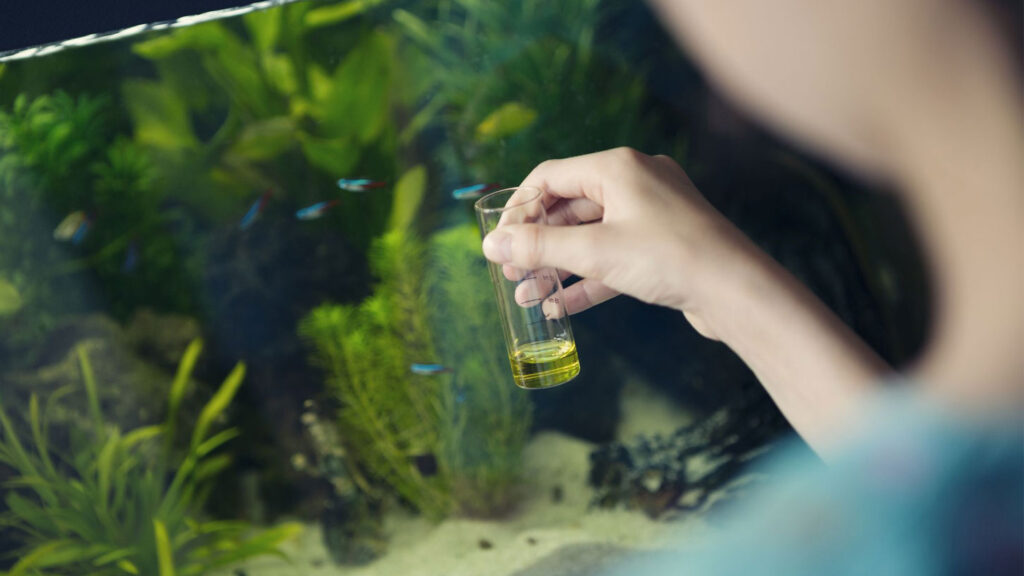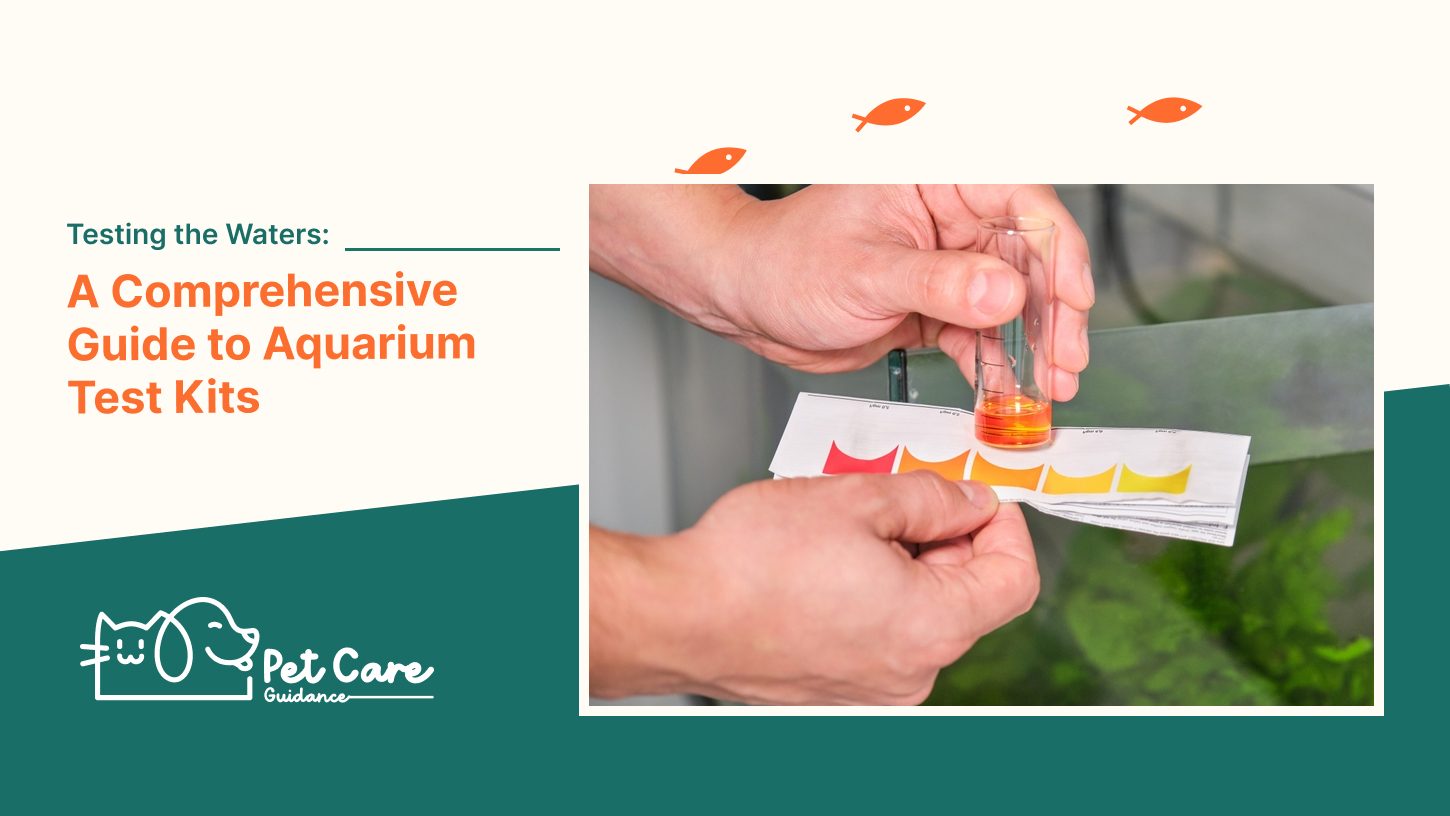The API Freshwater Master Test Kit is recommended as the best test kit for freshwater aquariums, while the Salifert Master Reef Testing Combo Kit is recommended for saltwater aquariums. These kits provide multiple tests to measure various factors such as pH, nitrate, nitrite, and more, ensuring clean and healthy water for your aquatic environment.
Understanding Water Parameters For A Healthy Aquarium
Aquarium test kits are essential tools for maintaining a healthy aquarium. Understanding water parameters is crucial to ensure the well-being of your fish and plants. One important water parameter to consider is the pH level. pH measures the acidity or alkalinity of the water and can greatly affect the health of your aquatic life.
Monitoring ammonia levels is also important as high levels can be toxic to fish. Similarly, nitrite levels should be monitored as they can indicate the progress of the nitrogen cycle in your aquarium. Lastly, nitrate levels should be kept in check as high levels can lead to algae growth.
It’s important to regularly test and monitor these parameters using reliable aquarium test kits. These kits are available in various forms such as test strips or liquid-based solutions. They are designed to provide accurate readings, allowing you to make the necessary adjustments to maintain a healthy aquatic environment. Investing in a good test kit is essential for any aquarium owner who wants to ensure the well-being of their aquatic pets.
Choosing The Right Test Kit For Your Aquarium
When it comes to choosing the right test kit for your aquarium, you have two main options: test strips and liquid test kits. Test strips offer a quick and convenient way to test water parameters, but they may not provide as accurate or detailed results as liquid test kits. On the other hand, liquid test kits are more precise and can measure a wider range of parameters, but they require more time and effort.
When selecting a test kit, consider the brand and its features. Some popular brands include API, Tetra, and Top Fin, which offer a variety of test kits for different types of aquariums. Look for kits that can measure key parameters such as pH, ammonia, nitrite, nitrate, and alkalinity.
For freshwater aquariums, the API Freshwater Master Test Kit and the Tetra 5-in-1 EasyStrips are highly recommended. For reef aquariums, the API Reef Master Test Kit and the Salifert Nitrate Test Kit are top choices. Additionally, there are test kits available for specific parameters like GH & KH, calcium hardness, and chlorine.

Proper Testing Techniques And Tips
Proper aquarium testing techniques are essential for maintaining a healthy aquatic environment. It is important to follow a step-by-step guide to testing water parameters to ensure accurate results. Begin by gathering the necessary test kits for ammonia, nitrite, nitrate, pH, and other relevant parameters.
Common mistakes to avoid when testing aquarium water include using expired test kits, not following the instructions accurately, and not calibrating the test equipment regularly. Additionally, make sure to accurately record and interpret the test results. This will help you identify any potential issues and take appropriate action.
How often you should test your aquarium water will depend on various factors, such as the size of your tank, the number of fish, and the specific needs of the species you are keeping. As a general guideline, testing once a week is recommended. However, if you notice any signs of stress or unusual behaviour in your fish, it is important to test the water immediately.
Interpreting test results requires understanding the acceptable ranges for each parameter. Consult reputable sources or seek advice from experienced aquarists to determine the ideal values for your specific setup. Regularly monitoring and maintaining proper water parameters will help ensure the health and well-being of your aquarium inhabitants.
Calibration And Maintenance Of Test Kits
In order to ensure accurate and reliable results, it is crucial to calibrate and maintain your aquarium test kits regularly. Regular calibration is important as it verifies the accuracy of your test kit and ensures that it is providing correct measurements. This is especially important if you rely on the test results to monitor the water parameters in your aquarium.
Calibrating your test kit involves comparing the results of the test to a known standard and adjusting the kit if any discrepancies are found. It is recommended to calibrate your test kit at least once a month or whenever you notice any inconsistencies in the readings.
In addition to calibration, proper maintenance of your test kit is essential for its long-lasting performance. This includes keeping the test reagents in a cool and dry place, replacing expired reagents, and cleaning the test tubes and equipment regularly to avoid contamination.
By following these calibration and maintenance tips, you can ensure that your test kit is providing accurate readings and effectively helping you monitor the water parameters in your aquarium.
Quality Control In Test Kits
When it comes to aquarium test kits, quality control measures are crucial to ensure accurate and reliable results. Understanding the importance of quality control is essential for all aquarium enthusiasts.
One important aspect of quality control is checking for expiration dates and batch numbers on test kits. These indicators help determine the freshness and validity of the product. Always make sure to use test kits that are within their expiration date and from a reliable batch.
Tips for identifying reliable and accurate test kits include doing thorough research on well-known and trusted brands, reading customer reviews, and consulting with experienced aquarium professionals. It’s also important to be cautious of extremely low-priced test kits, as they may not provide accurate results.
In conclusion, good quality control measures, such as checking for expiration dates and batch numbers, as well as identifying reliable and accurate test kits, are essential for maintaining a healthy aquarium. Trustworthy test kits will provide accurate results, helping you ensure optimal water conditions for your aquatic pets.

Addressing Common Water Parameter Issues
Elevated ammonia or nitrite levels in the aquarium can be harmful to fish and other aquatic organisms. These can often occur due to overfeeding, overcrowding, or inadequate filtration. To address this issue, it is essential to regularly test the water parameters using aquarium test kits. These kits provide accurate measurements of ammonia and nitrite levels, allowing you to take appropriate action.
Nitrate is another common water parameter issue, particularly in established aquariums. High nitrate levels can result from excess fish waste and decaying organic matter. It is crucial to maintain nitrate levels below a certain threshold to ensure the health of your aquatic animals. Regular testing with nitrate test kits is necessary to monitor and control nitrate levels effectively.
The pH level of aquarium water is also crucial for the well-being of fish and plants. Incorrect pH levels can lead to stress, disease, and even death in some species. Whether you have a freshwater or a saltwater aquarium, it is vital to ensure that the pH level remains within the appropriate range. Testing the pH regularly using pH test kits will help you identify and address any pH imbalances.
Preventative Measures For Maintaining Water Quality
Establishing a regular maintenance routine is crucial for keeping your aquarium’s water quality in check. Regular water testing is essential to identify and address any issues before they become major problems. Test kits can provide accurate and reliable results for parameters such as pH, ammonia, nitrite, and nitrate levels.
- Proper diet and feeding habits play a significant role in maintaining water quality. Overfeeding can lead to excess waste and increased nutrient levels, while inadequate feeding can affect the overall health of your aquatic inhabitants. Feeding your fish a balanced diet and ensuring they consume all the food within a few minutes can help prevent water quality issues.
- Effective filtration is another key aspect of water quality management. Choose a filter system appropriate for your aquarium size and ensure it is regularly cleaned and maintained. Additionally, regular water changes are necessary to remove accumulated waste and replenish essential nutrients. Aim to change 10-20% of the water on a weekly or biweekly basis.
The Role Of Aquarium Test Kits In Maintaining A Healthy Aquarium
|
Frequently Asked Questions Of Aquarium Test Kits
What Is The Easiest Aquarium Test Kit?
The easiest aquarium test kits are the API Freshwater Master Test Kit for freshwater tanks and the Salifert Master Reef Testing Combo Kit for saltwater tanks. These kits contain multiple tests to measure pH, nitrate, nitrite, and more for clean and healthy water.
Are Aquarium Water Test Strips Accurate?
Yes, aquarium water test strips can be accurate for testing water quality in fish tanks. They provide quick and convenient results, measuring parameters like pH, nitrate, and nitrite levels. However, it’s important to note that they may not always be as accurate as more advanced testing methods.
Does Petsmart Test Aquarium Water For Free?
Yes, Petsmart does provide free aquarium water testing.
Do You Need an Aquarium Test Kit?
Yes, you need an aquarium test kit to ensure the water in your tank is clean and healthy. We recommend the API Freshwater Master Test Kit for freshwater tanks and the Salifert Master Reef Testing Combo Kit for saltwater tanks.
These kits contain multiple tests to measure pH, nitrate, nitrite, and more.
Conclusion
To ensure the health and well-being of your aquarium, investing in a reliable test kit is essential. From measuring pH levels to nitrate and nitrite levels, the API Freshwater Master Test Kit is highly recommended for freshwater tanks. For saltwater tanks, the Salifert Master Reef Testing Combo Kit is a top choice.
These kits provide comprehensive tests to maintain clean and healthy water for your aquatic environment. Don’t compromise on the quality of your aquarium test kit – choose the best for stunning results.


